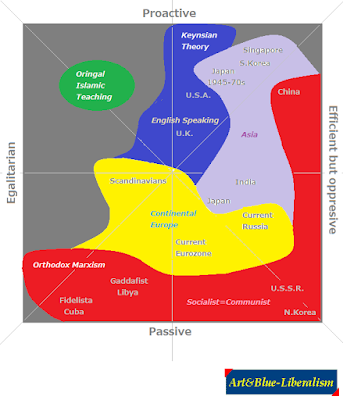Friday, September 21, 2018
Economic Political Compass/Spectrum
From economists' point of view, the economic scale based on goverment size (big v.s. small) in Political Compass is not useful to explain the real impact of policy on economy. In the real world economy, government size does not seem to matter whether a nation/community impliments elitist or egalitarian policy. The real matter is the intentional objective whether a government or a community aspires to accomplish.
Both capitarist economy based on a severe competition of private enterprises and socialist economy mainly operated by a government central planning support meritocracy establishing an efficient mechanism of sustaining productivity and a rigid hierarchy maintaining a stable social order. By contrast, more egalitarian economies may keep a feasible balance of government size and freeness of private enterprises, and this balance varies across different geographic and ethinic characteristics.
Singapore and South Korea encourage a high economic freedom of private business competition and also maintain a roll of big government propping up public goods and social order. In these nations, the big government sustaining the stable social order and bearing the responsibility of administrating public sectors assist growing the private businesses and the furthermore economic freedom. In addition, Singaporean and South Korean economy keeps their capacity of controlling business cycles. While remaining the relatively free market economy, their big and proactive government is prepared for mitigating either overheated or hard-falling of their business cycle.
Modern continental European nations tend to focus on encouraging more egalitarian values and freedom of expressions more than economic efficiency. Their government roll is bigger than the U.S.A. and the U.K. but smaller than both socialist and the aforementioned emerging Asian nations. In particular, the current Eurozone seems to be afrain of an excessive government intervention into its economy because of the predicted excess cost of implimenting it in such a huge economic zone with its unstable fiscal and regulatory structure which is still not well integrated. This unstability is also the cost of accomplishing their ideal of European integration with an egalitarian value.
Scandinavians are far more famous for accomplishing egalitarianism while maintainig their reasonably strong economy as well as their political and social stability. They still keep their proactive capacity relatively more than the Eurozone because they are not in a part of a massive complicated economic zone like Eurozone. But, Scandinavian economic policy is not so much proactive because they have been historically famous for their conservative macroeconomic policy reluctant to spend government expenditure for economic stimulus. Instead of spending for incentivising the macroeconomic performance, they put priority on sparing their expenditure for their generous welfare programming for their egalitarianism.
Judging from these examples, the key scales of distinguishing economic policies should be the "efficient but oppressive v.s. egalitarian" axis and the "proactiveness v.s. passiveness" axis instead of a simple big v.s. small axis. An efficient but oppresive policy with a proactive attitude focuses on sustaining a remarkable economic performance while their stratified elitism may increas a frustration of subordinate citizens. An egalitarian policy focuses on spending for their egalitarian ideals while sacrificing their efficiency of stimulating their economic performance.
There is an notorious policy which should be called the "efficient but oppressive and passive". This one has been frequently seen in various primitive developing nations and the USSR style communist nations. Their passiveness comes from their lack of economic ratinale of either not understanding economics or intentionally abandoning economic well being for their eccentric dogma. The egalitarianism is also ignored because the minority ruling class controlling their dogmatic state hold their ultimate power of controlling the rest of people.
The "egalitarian and proavtive" policy hardly appears in the real world but Islamism often indicates the economic policy in their teaching. Islam is famous for involving teaching about economy in their religious teaching which claims for letting money following without not stuck in one place and being generous to give away for saving deprived ones. This policy suggests for a volutary religious will of individuals instead of a modern government intervention for implimenting egalitarianism so that this is another remarkable example of something the "big v.s. small government" does not seem to explain.
Monday, September 10, 2018
Rosh Hashanan! Happy Jewish New Year!
Khavar Yakar, Rosh Hashanan!
Dear friends, Happy Jewish New Year!
Dear friends, Happy Jewish New Year!
Subscribe to:
Posts (Atom)
